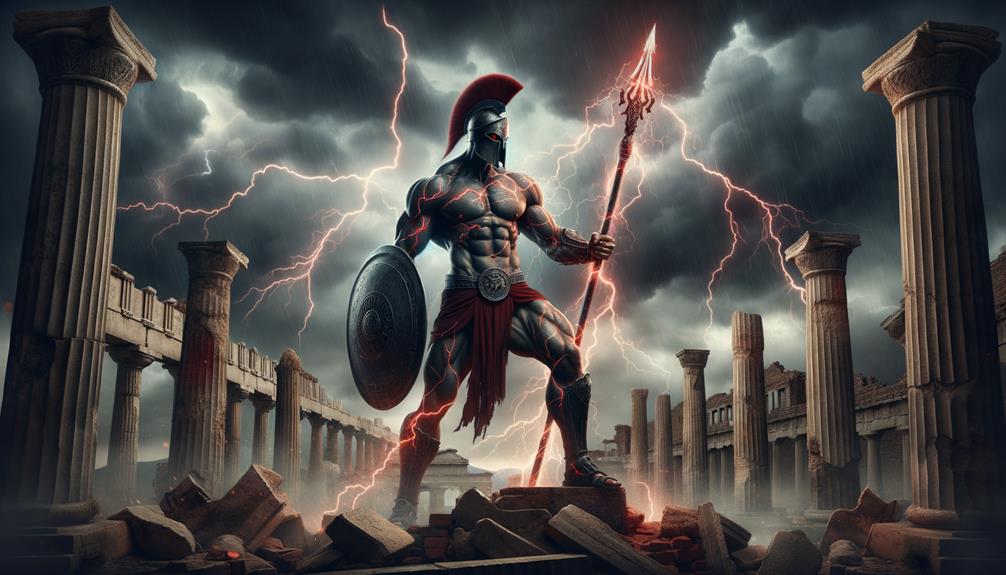Diving into the World of Ares: The Greek God of War
In the rich tapestry of ancient mythology, the figure of Ares, the Greek god of war, stands imposing and formidable. As the embodiment of warfare, Ares symbolizes not just the uncontrolled violence and chaos of conflict, but also the bravery and honor of warriors. Let's immerse ourselves in the compelling world of Ares, exploring the deeper meaning behind this powerful symbol of war.
Ares: More than a Symbol of War
Ares, the embodiment of warfare, is a complex figure. He's not just about blood-curdling battle cries and the clash of swords. Yes, his name evokes images of chaos and violence, but it also underscores the courage and valor of those who dare to face the battlefield. His story is a vivid reminder that war is not just about destruction, but also about bravery and resilience.
Exploring the Intricate Tales of Ares
The stories surrounding Ares are filled with gods, heroes, and monsters, each adding to the richness of his legend. These narratives allow us to examine the nature of war and its role in human society from an ancient perspective. They encourage us to question, to reflect, and to understand. This exploration gives us a unique insight into the tumultuous world of Ares.
Venturing Further into Ares' World
So, are we ready to delve deeper into the world of Ares, to understand the raw essence of war? Are we prepared to navigate the complex narratives that surround this god of war, to comprehend his true essence? We invite you to join us on this journey, to immerse yourself in the fascinating stories of Ares, and to explore the depth and complexity of this legendary figure.
In Conclusion
Understanding Ares is about more than just exploring ancient mythology. It's about recognizing the courage and valor that exist within chaos, about appreciating the complexity of human emotions during conflict. It's about delving into our history, our culture, and our values. Therefore, let's continue to explore, understand, and appreciate the intricate world of Ares, the Greek god of war.
Ares: The God of War

Ares: A Deeper Look at the God of War
Delving into the rich tapestry of Greek mythology, we uncover the intriguing character of Ares, renowned as the deity of war and bravery. He showcases not just the gallantry associated with physical conflict but also the ruthless savagery and intense ferocity triggered by war. Being the offspring of Zeus, the regal sovereign of gods, and Hera, the queen, Ares' lineage is steeped in power. His formidable prowess in war was celebrated across the ancient Greek civilization.
However, it's worth noting that despite his illustrious lineage, Ares didn't earn acclaim for his military strategy or leadership skills. His volatile temper often propelled him towards hasty actions, thereby bypassing the strategic nuances that his counterpart, the Greek warrior Athena, held in high regard. Ares was a deity of straightforward action, delighting in the fervor of combat, formidable with his spear, and unyielding behind his warrior's helm and shield.
Historical findings, such as the Temple of Ares, reflect his significant influence in Greek mythology, even if his role was relatively limited. His symbols, including serpents, vultures, and owls, powerfully depict the raw, unrefined essence of warfare he personified. Essentially, Ares represented the ruinous power of war, a stark divergence from the civilized art of war symbolized by Athena.
Embodying the Destructive Force of War: Ares vs. Athena
Contrasting the two, Ares comes across as the representation of war's destructive force, while Athena signifies the more civilized and strategic aspect of warfare. This comparison serves to highlight the multifaceted nature of war as perceived in Greek mythology. It's not just about the clash of swords or the thrill of victory; it's also about planning, strategy, and making difficult choices under pressure.
Our deeper understanding of Ares wouldn't be complete without examining the archaeological evidence that underscores his influence. The Temple of Ares is one such testament to his significance. Although his role in the Greek pantheon may have been limited, his influence was substantial, as reflected in the awe and fear he inspired.
For a more immersive experience into Greek mythology and a real-world exploration of Ares' legacy, consider visiting the Temple of Ares in Athens or delve into detailed accounts of his exploits in Homer's Iliad. The vivid descriptions and events in these sources bring the god of war to life in a way that no simple retelling can achieve.
In conclusion, Ares, the god of war, is more than just a symbol of physical conflict. He embodies the raw intensity, the ruthless savagery, and the unyielding power that are as much a part of war as strategy and cunning. He is a reminder that war is not just about winning; it's about the struggle, the chaos, and the ultimate price of victory.
"Ares was a deity of straightforward action, delighting in the fervor of combat, formidable with his spear, and unyielding behind his warrior's helm and shield." – A fitting testament to the god of war in Greek mythology.
The Birth and Family of Ares
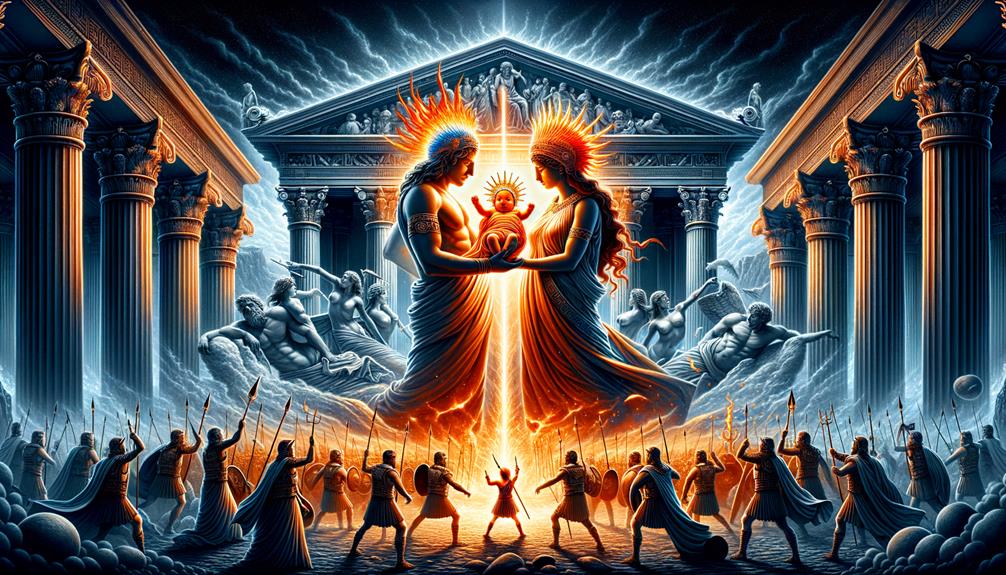
Unveiling Ares: A Journey into His Birth and Lineage
Unraveling the enigmatic character of Ares, we dive deep into a lineage characterized by might, fervor, and intricacy. In the annals of Greek mythology, Ares emerges as the offspring of Zeus and Hera, two paramount Olympian deities. Ares, a member of *The Twelve Greek Gods*, holds the distinction of being their lone progeny, thus setting him apart from the rest of the ancient deities.
But Ares' story doesn't culminate with his divine parentage. He himself stepped into parenthood, fathering three celestial children with Aphrodite, the divine embodiment of love. Their progeny—Deimos, Phobos, and Harmonia—upheld the legacy of their parents, personifying elements of warfare, terror, and harmony respectively. Notably, Harmonia, Ares' daughter, further extended this lineage by becoming a mother to Semele, who subsequently gave birth to Dionysos, another pivotal figure in Greek mythology.
Ares' parenthood also extended to the mortal realm, fathering several children often portrayed as antagonists in Greek narratives, thereby amplifying his stature as a war deity. Yet, Ares was not bereft of siblings. He shares the same divine lineage with Eileithyia, Hebe, and Hephaestus, each commanding significance in their respective domains.
Ares' Siblings: The Other Divine Progeny
This intricate network of familial ties highlights the complex dynamics within the family of ancient Greek gods. This deep dive into the family tree of Ares presents a fascinating understanding of the interconnectedness and relationships among the ancient Greek deities.
Ares in Greek Mythology
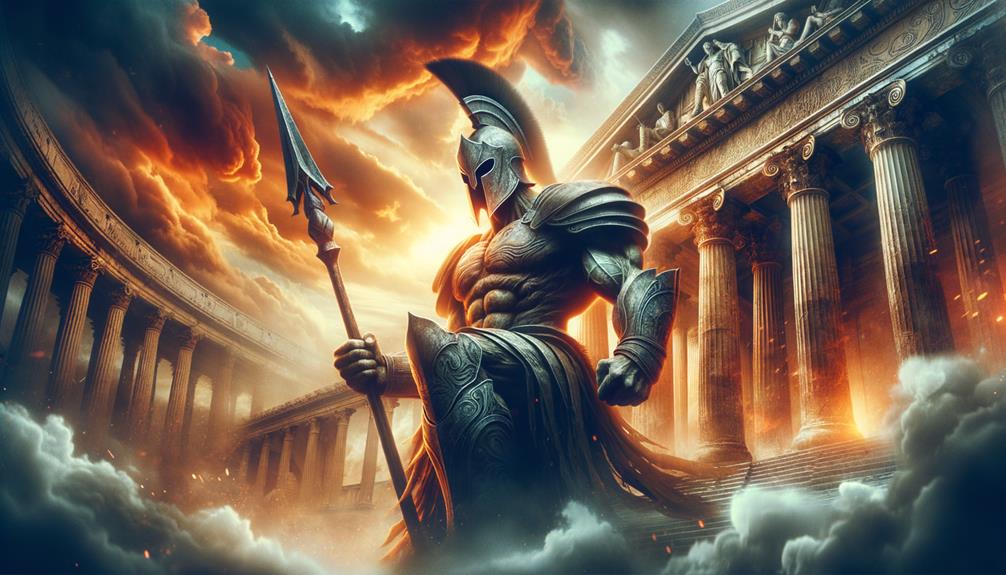
Unraveling the Intricacies of Ares in Greek Mythology
Ares, a figurehead in Greek mythology, is often depicted as the unbridled representation of brutal warfare and raw valor. As we delve into the captivating realm of ancient myths, this deity stands out with a portrayal that's far from benevolent, arguably making him the most despised among the gods.
Diving deeper, there's an ambivalence that envelops the Greeks' perception of Ares. They acknowledge his courage, but his relentless brutality is a source of disdain. A prime example of this is the notorious affair Ares had with Aphrodite, the goddess of love, while she was wedded to Hephaestus, the deity of blacksmiths and craftsmen. The incident, which culminated in Hephaestus ensnaring them in his net leading to a mockery by the other gods, left Ares humiliated.
| Aspect | Ares' Role | Audience Emotion |
|---|---|---|
| Spouse to Hephaestus | Embarrassed by his wife's infidelity | Amusement |
| Illicit affair with Aphrodite | Revealed his unrestrained side | Intrigue |
| Ambivalence of the Greeks | His savagery eclipsed his valor | Disdain |
| Disliked by all gods | His violent temperament incited fear | Apprehension |
Despite the lack of favorable portrayals in the myths, Ares remains a captivating character in the pantheon, epitomizing the unchecked aspect of war. The stories involving this Greek war god are a testament to his complex character, inspiring intrigue among the audience.
In the grand scheme of Greek mythology, Ares embodies the wild and raw side of warfare. He is a character that, despite his brutal nature, continues to fascinate us, offering a unique perspective on war's untamed aspect. His stories, while often painting him in a less flattering light, are a crucial part of the rich tapestry of Greek myths, adding depth and complexity to the narrative.
Bold, brutal, and unbridled – Ares is a figure that commands attention and respect. Even in the midst of disdain and fear, the god of war stands as a testament to the raw power and inherent danger of warfare, portrayed with a stark honesty that is as gripping as it is unsettling.
The Symbolism of Ares
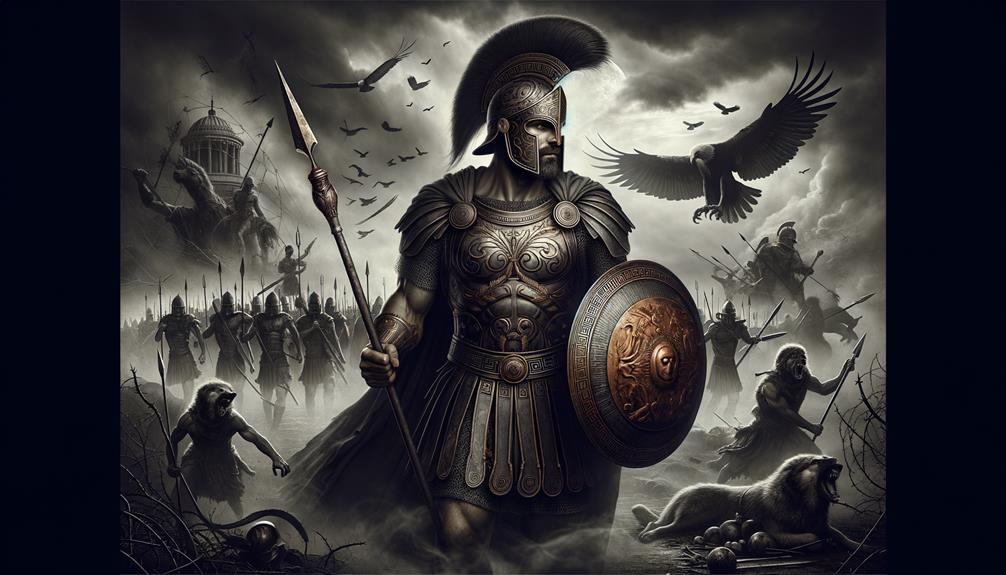
The Intricate Symbolism of Ares: A Greek God with a Multifaceted Character
Diving deep into the mythology of Ares, the Greek god of war, unravels a complex tapestry of rich symbolism. Ares, depicted as a fearsome warrior armed with a helm, shield, and spear, epitomizes the multifaceted nature of warfare in both Greek and Roman cultures. His impulsive demeanor in battle, represented by his name which translates to 'ruin' or 'bane' in Greek, highlights his physical bravery and stark brutality.
Ares and Mars: The Two Faces of War
Interestingly, Ares' Roman equivalent, Mars, holds a more prominent position in Roman religion. Mars is revered as an ancestral protector, contrasting sharply with the Greek perception of Ares. This distinction underscores the multifaceted symbolism of Ares, reflecting both the glory and grim reality of warfare.
Ares and Aphrodite: Love Amidst War
Another intriguing facet of Ares' character emerges from his affair with Aphrodite, the goddess of love. This liaison, dubiously regarded, resulted in his humiliation, revealing a more vulnerable side of the war deity. His progeny, known as the warlike, further underscore his martial symbolism.
Ares in Ancient Society: Hymn 8
The impact of Ares' symbolism on ancient societies is evident in Hymn 8 dedicated to the god. This hymn calls upon Ares for strength and triumph in war, shedding light on how the ancient societies perceived him.
The Complex Tapestry of Ares' Symbolism
The symbolism of Ares is a labyrinth of contrasting elements, reflecting both the magnificence and the harsh reality of war. His complex character offers an engaging exploration of how ancient societies perceived warfare, making him a fascinating figure in Greek mythology.
Ares' Transition to Roman Mars
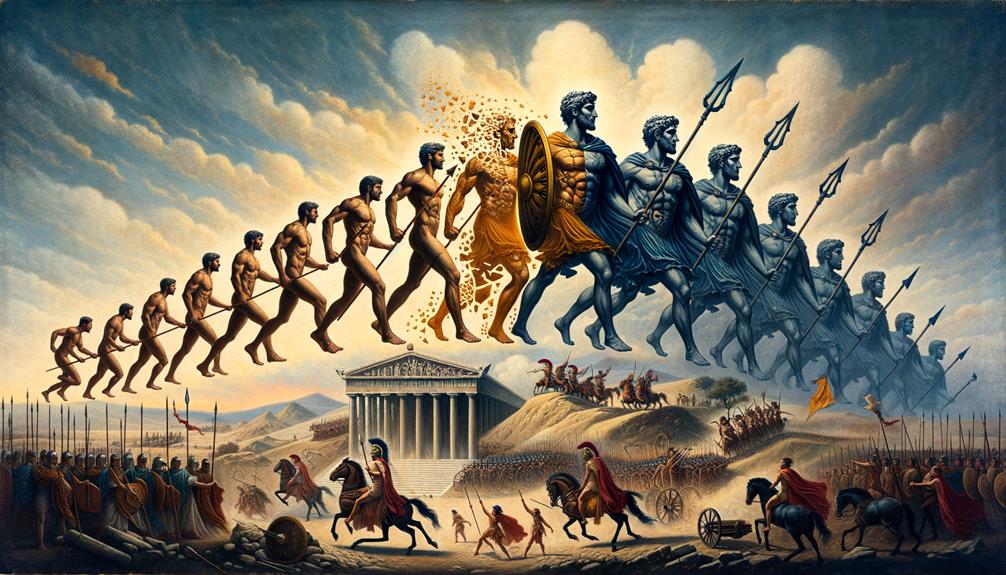
Ares to Mars: A Transformation from Greek to Roman Mythology
In the fascinating realm of mythology, the transition of Ares to Mars illustrates a unique shift in divine characterization. As we traverse from Greek to Roman myths, we witness Ares morphing into Mars, a figure that enjoyed a more esteemed status. Mars was not just the embodiment of war, but also the guardian spirit of the Romans' ancestors. This marked a significant departure from Ares' depiction in Greek mythology, which was characterized by turbulence and discord with Zeus and Hera on Mount Olympus. In contrast, Mars was celebrated as the guardian of Rome, a role that substantially amplified his standing.
Ares: The Fearsome God of War
In the mythological tales of Ancient Greece, Ares was a formidable deity of war. He was the offspring of Zeus and Hera, and Aphrodite's spouse. Ares' offspring, Phobos and Deimos, represented the terror and dread that warfare incites, and joined their father in the Trojan War. Hephaestus, Ares' half-sibling and the gods' craftsman, was often the one forging his war equipment.
Mars: The Respected Roman Deity
As Mars in Roman mythology, Ares' personality underwent a significant transformation. He came to symbolize more than just war – he was an emblem of agriculture and the Roman state, earning him a revered position, second only to Jupiter. As the progenitor of Romulus, one of Rome's originators, Mars was directly linked to the city's lineage. This shift from the brutal Ares to the esteemed Roman Mars mirrored the Romans' altered perception of warfare and its associated divinities.
The transition from Ares to Mars reflects the cultural nuances and societal values of the Greeks and Romans. This narrative underscores the importance of understanding historical contexts when interpreting mythological figures, providing us with a deeper comprehension of our shared past. The transformation from a feared war deity to a respected guardian is not merely a change in names, but a testament to the fluidity of divine representations across cultures.
Unraveling the Myths
With a considerable shift in character from the Greek Ares to the Roman Mars, mythology offers us a rich tapestry of narratives that shape our understanding of ancient cultures. This transition serves as a potent reminder of the transformative power of storytelling and the importance of context in understanding our shared heritage. It's a fascinating journey, one that continues to captivate us with its timeless tales of gods and heroes.
Diving into these mythological tales, we understand how the Greeks and Romans viewed war, conflict, and their divine entities. Such exploration not only enhances our appreciation of ancient cultures but also provides valuable insights into the evolution of societal values over time.
Frequently Asked Questions
Why Ares Is a Bad God of War?
Why Ares Doesn't Meet the Mark as a God of War
In my perspective, Ares falls short of being an exemplary war deity. He embodies *mindless violence* which is devoid of any strategy, and this lack of strategic thinking is a significant drawback. With a penchant for reckless actions, scandals, and frequent embarrassments, his status in comparison to other gods is significantly tarnished.
The Deficiency of Strategy in Ares
Ares is often associated with *haphazard violence*, completely devoid of any tactical approach. In the context of war, strategy is a key element; it's the difference between a victorious general and a defeated one. Ares, with his impulsive drive, fails to embody this essential aspect of war.
Ares' Recklessness: A Stain on His Reputation
Another factor that undermines Ares' stature amongst the gods is his history of reckless actions and scandals. This behavior not only damages his reputation but also makes him a less reliable figure when it comes to the serious business of war.
Frequent Humiliations: A Blow to His Standing
Repeated instances of humiliation further tarnish Ares' image. A god of war is expected to command respect and fear, but these embarrassing moments cast Ares in a less than favorable light.
In Conclusion: Ares – A God of War?
In light of these factors, it's clear that Ares falls short as a god of war. He lacks strategic thinking, indulges in reckless behavior, and his reputation is marred by scandals and humiliations. These traits don't exactly paint the picture of a formidable god of war, but rather that of an impulsive and reckless deity. This assessment may encourage a reconsideration of Ares' standing amongst his divine peers.
In the realm of war deities, Ares certainly offers a unique perspective, but the question remains – is it one that truly epitomizes the essence of war? When considering a war deity, one might be better off looking towards those who embody strategy, respect, and a strong reputation – traits that Ares, unfortunately, lacks.
What God Killed Ares?
Understanding Ares: The Immortal God of Greek Mythology
Ares, the immortal warrior of Greek mythology, never met his demise at the hands of any particular deity. Known for his eternal presence and unparalleled resilience, he remains undefeated across countless battles. Brought to life with vibrant tales of courage and strength, Ares embodies the essence of enduring existence.
The Everlasting Ares: No God Met His Match
This unique characteristic of Ares – his immortality – is a significant aspect of his persona that sets him apart. The God of War, as he is often called, has been a constant figure in Greek mythology, never succumbing to any other god. His eternal existence is a testament to his strength and invincibility.
A Symbol of Resilience and Immortality
As an emblem of resilience, Ares reminds us of the power of endurance and the ability to overcome even the most formidable challenges. Moreover, he is a shining example of the Greek gods' immortality, a concept that has fascinated humans for centuries.
Ares: Immortal without Rivals
Despite being the God of War, Ares was never defeated, symbolizing that he was truly unbeatable. His eternal existence underscores the strength inherent in his character, representing the unyielding spirit of a true warrior.
Engage with the Tales of Ares
For readers keen to delve deeper into the narratives of Greek mythology and discover the timeless tales of gods like Ares, we recommend Percy Jackson's "Greek Gods". This entertaining and enlightening book offers an engaging look at the lives and adventures of the ancient deities.
Why Did Zeus Hate Ares?
Zeus' Disapproval of Ares: A Clash of Ideals
When we delve into the intriguing world of Greek mythology, Zeus' intense resentment towards Ares often raises curiosity. The root cause of this animosity stemmed from Ares' aggressive and battle-hungry demeanor, which stood in stark contrast to Zeus' preference for strategic and tactical warfare.
Why Ares' Approach Didn't Resonate with Zeus
Ares, the god of war, was infamous for his ruthless and chaotic tactics. His unrestrained and violent methods were a far cry from the strategic approach of his sister, Athena, which Zeus admired greatly. This divergence in values led to Zeus' disapproval of Ares, painting a vivid picture of the ideological clash between the two gods.
Zeus' Ideals: The Power of Strategy
Zeus, the king of the gods, appreciated a more calculated and tactical approach to warfare, akin to Athena. His preference for strategic methods over brute force further accentuated his discontent with Ares' brutal approach. This preference of Zeus is a real-world example of the adage 'brains over brawn'.
The Impact of Their Conflict
This dissonance in their ideologies not only stirred a rift between Zeus and Ares but also offered intriguing insights into their distinct personalities, their values, and their approach towards conflict resolution. It serves as a reminder that even in mythology, strategic thinking is often favored over reckless aggression.
The Significance of Understanding Zeus' Disapproval
By exploring Zeus' disapproval of Ares, we gain a deeper understanding of the dynamics between the gods in Greek mythology. It's a valuable lesson that emphasizes the power of strategy and tact over unrestrained aggression, a principle that resonates even in today's world.
Is Ares the God of War a Girl?
Is Ares the God of War Female?
No, Ares, the renowned God of War in Greek mythology, is not depicted as a female. His representation is rooted in a distinctly masculine identity, known for portraying the very essence of warfare. This portrayal is not just a vague generalization, it's a well-documented fact in the annals of ancient Greek culture.
Ares: The Male Embodiment of War
In the grand narrative of Greek mythology, Ares stands tall as a symbol of masculinity, strength, and valor. His figure is synonymous with the raw physical power that is typically associated with warfare. This isn't just an abstract concept, but a key factor in understanding the character of Ares as a divine entity.
An Icon of Masculinity in Greek Mythology
To provide a real-world example, imagine a soldier in the heat of battle, showcasing not only physical prowess but also bravery and determination. This is the image that Ares embodies in the pantheon of Greek gods. His masculine attributes serve as a mirror reflecting these same qualities in human warriors.
Delving Into the Identity of Ares
In conclusion, Ares the God of War, is not a girl. His identity is firmly entrenched in the masculine, a fact backed by numerous examples and references in Greek mythology. So next time when you come across Ares in a text or conversation, remember the image of a strong, brave, masculine deity he represents.

